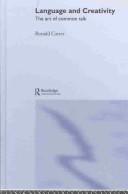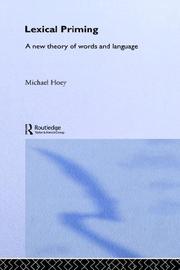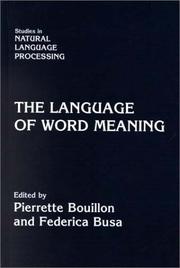| Listing 1 - 9 of 9 |
Sort by
|
Book
Year: 1966 Publisher: New York : Harper & Row,
Abstract | Keywords | Export | Availability | Bookmark
 Loading...
Loading...Choose an application
- Reference Manager
- EndNote
- RefWorks (Direct export to RefWorks)
Cartesian linguistics --- Creativity (Linguistics) --- Generative grammar --- Créativité (Linguistique) --- Grammaire générative

ISBN: 0415234484 0415234492 9780415234481 9780415234498 Year: 2004 Publisher: New York: Routledge,
Abstract | Keywords | Export | Availability | Bookmark
 Loading...
Loading...Choose an application
- Reference Manager
- EndNote
- RefWorks (Direct export to RefWorks)
Creativity (Linguistics) --- Sociolinguistics --- Créativité (Linguistique) --- Conversatieanalyse --- Creativiteit (linguïstiek) --- Creativity (Linguistics). --- Creativiteit (linguïstiek). --- Créativité (Linguistique) --- Pragmatics --- Sociolinguistics. --- Conversatieanalyse. --- Sociolinguïstiek. --- Sociolinguistique
Book
ISBN: 9782343077598 Year: 2015 Publisher: Paris : L'Harmattan,
Abstract | Keywords | Export | Availability | Bookmark
 Loading...
Loading...Choose an application
- Reference Manager
- EndNote
- RefWorks (Direct export to RefWorks)
A travers un important corpus, l'auteur montre comment les écrivains africains ont su renouveler l'écriture et exprimer au plus près les aspirations des peuples à qui ils prêtent leur voix en ayant recours à des procédés linguistiques inventifs : emploi de néologismes, dérivation, suffixation, troncation, intertextualité, etc. ©Electre 2016
African fiction (French) --- Creativity (Linguistics) --- French language --- Roman africain (français) --- Créativité (Linguistique) --- Français (Langue) --- History and criticism --- New words --- Histoire et critique --- Néologismes
Book
ISBN: 9781474298919 9781474298926 9781474298933 9781474298940 Year: 2019 Publisher: London Bloomsbury Academic
Abstract | Keywords | Export | Availability | Bookmark
 Loading...
Loading...Choose an application
- Reference Manager
- EndNote
- RefWorks (Direct export to RefWorks)
Cognitive Grammar in Stylistics: A Practical Guide provides an engaging, accessible and practically-focused introduction to cognitive grammar outlining how central principles of the field can be used in stylistic analyses. Assuming no prior knowledge, the book leads students through the basics of cognitive grammar, outlining its place within the field of cognitive linguistics as a whole, providing clear explanations of key principles and concepts. It then explains how these can be used to study a range of literary and non-literary texts.The book argues that cognitive grammar offers a powerful alternative to more traditional grammatical models when analysing texts. Its primary focus is on the practical application of cognitive grammar to examples of language in context and on its potential for both literary and non-literary material. It offers a clear and facilitating approach to allow students to describe language features carefully and to explore how these descriptions can be developed into full and rich analyses.Suitable for undergraduate students taking modules in stylistics, English language, and cognitive linguistics, as well as postgraduates encountering the field for the first time, the book provides a much-needed and essential guide to this exciting subject.
Cognitive grammar. --- Grammar, Comparative and general --- Language and languages --- Creativity (Linguistics) --- Linguistique cognitive --- Grammaire comparée --- Créativité (linguistique) --- Style. --- Style littéraire. --- Stilistics --- Grammar --- Psycholinguistics --- Grammaire comparée --- Créativité (linguistique) --- Style littéraire.
Book
ISBN: 9781408251881 9781315833224 9781317861218 9781317861225 9781138146006 Year: 2012 Publisher: Harlow Pearson
Abstract | Keywords | Export | Availability | Bookmark
 Loading...
Loading...Choose an application
- Reference Manager
- EndNote
- RefWorks (Direct export to RefWorks)
Discourse and Creativity examines the way different approaches to discourse analysis conceptualize the notion of creativity and address it analytically. It includes examples of studies of creativity from a variety of traditions and examines the following key areas, how people interpret and use discourse, the processes and practices of discourse production, discourse in modes other than written and spoken language, and the relationship between discourse and the technologies used to produce it.Discourse and Creativity combines a forward-thinking and interdisciplinary approach to the topic of creativity; this collection will be of great value to students and scholars in applied linguistics, stylistics, and communication studies.
creativiteit --- Developmental psychology --- creativity --- Pragmatics --- Discourse analysis --- Creation (Literary, artistic, etc.) --- Creativity (Linguistics) --- Communication and technology --- Semantics --- Analyse du discours --- Créativité (linguistique) --- Communication et technologie --- #KVHA:Taalkunde --- #KVHA:Discourse analysis --- #KVHA:Creativiteit --- Discourse grammar --- Text grammar --- Semiotics --- Creative ability (Linguistics) --- Linguistic creativity --- Competence and performance (Linguistics) --- Linguistics --- Psycholinguistics --- Technology and communication --- Technology --- Discourse analysis. --- Analyse du discours. --- Communication et technologie. --- Créativité (linguistique)

ISBN: 1134333595 0203385640 1283707985 1280156244 0203327632 9780203327630 9781280156243 9780203385647 9786610156245 6610156247 9780415328623 0415328624 9780415328630 0415328632 0415328632 0415328624 9781134333547 9781134333585 9781134333592 1134333587 Year: 2005 Publisher: London ; New York : Routledge,
Abstract | Keywords | Export | Availability | Bookmark
 Loading...
Loading...Choose an application
- Reference Manager
- EndNote
- RefWorks (Direct export to RefWorks)
Lexical Priming proposes a radical new theory of the lexicon, which amounts to a completely new theory of language based on how words are used in the real world. Here they are not confined to the definitions given to them in dictionaries but instead interact with other words in common patterns of use. Using concrete statistical evidence from a corpus of newspaper English, but also referring to travel writing and literary text, the author argues that words are 'primed' for use through our experience with them, so that everything we know about a word is a product of our encounters with it. This knowledge explains how speakers of a language succeed in being fluent, creative and natural.
Lexicology. --- Grammar, Comparative and general. --- Discourse analysis. --- Creativity (Linguistics) --- Creative ability (Linguistics) --- Linguistic creativity --- Competence and performance (Linguistics) --- Linguistics --- Psycholinguistics --- Discourse grammar --- Text grammar --- Semantics --- Semiotics --- Comparative grammar --- Grammar --- Grammar, Philosophical --- Grammar, Universal --- Language and languages --- Philosophical grammar --- Philology --- English language --- Grammar, Comparative --- Lexicology --- Lexicologie --- Grammaire comparée et générale --- Analyse du discours --- Créativité (Linguistique) --- Creativity (Linguistics). --- Lexicology. Semantics --- Pragmatics
Book
ISBN: 3484102098 3111357740 9783484102095 Year: 1974 Volume: 20 Publisher: Tübingen: Niemeyer,
Abstract | Keywords | Export | Availability | Bookmark
 Loading...
Loading...Choose an application
- Reference Manager
- EndNote
- RefWorks (Direct export to RefWorks)
Der Begriff der sprachlichen Kreativität in der neueren Linguistik (Linguistische Arbeiten)
Creativity (Linguistics) --- Créativité (Linguistique) --- -Psycholinguistics --- Creative ability (Linguistics) --- Linguistic creativity --- Creativity (Linguistics). --- Créativité (Linguistique) --- Language and languages --- -Linguistics --- 800 --- Language, Psychology of --- Psychology of language --- Speech --- Linguistic science --- Science of language --- Foreign languages --- Languages --- 800 Taalwetenschap. Taalkunde. Linguistiek --- Taalwetenschap. Taalkunde. Linguistiek --- Philosophy --- Methodology --- Psychological aspects --- Psychology --- Linguistics --- Psycholinguistics --- Thought and thinking --- Competence and performance (Linguistics) --- Psycholinguistics. --- Philosophy. --- Methodology. --- Psycholinguistique --- Langage et langues --- Linguistique --- Philosophie --- Méthodologie --- Language and languages - Philosophy --- Linguistics - Methodology

ISBN: 0521780489 0521080142 051189631X Year: 2001 Publisher: Cambridge Cambridge University Press
Abstract | Keywords | Export | Availability | Bookmark
 Loading...
Loading...Choose an application
- Reference Manager
- EndNote
- RefWorks (Direct export to RefWorks)
This volume is a collection of original contributions from outstanding scholars in linguistics, philosophy and computational linguistics exploring the relation between word meaning and human linguistic creativity. The papers present different aspects surrounding the question of what is word meaning, a problem that has been the centre of heated debate in all those disciplines that directly or indirectly are concerned with the study of language and of human cognition. The discussions are centred around a view of the mental lexicon, as outlined in the Generative Lexicon theory (Pustejovsky, 1995), which proposes a unified model for defining word meaning. The individual contributors present their evidence for a generative approach as well as critical perspectives, which provides for a volume where word meaning is not viewed only from a particular angle or from a particular concern, but from a wide variety of topics, each introduced and explained by the editors.
Lexicology. Semantics --- Mathematical linguistics --- Grammar --- Semantics. --- Creativity (Linguistics) --- Generative grammar --- Computational linguistics --- Sémantique --- Créativité (Linguistique) --- Grammaire générative --- Linguistique informatique --- Computational linguistics. --- Generative grammar. --- Creativity (Linguistics). --- Sémantique --- Créativité (Linguistique) --- Grammaire générative --- Semantics --- Formal semantics --- Semasiology --- Semiology (Semantics) --- Comparative linguistics --- Information theory --- Language and languages --- Lexicology --- Meaning (Psychology) --- Grammar, Comparative and general --- Grammar, Generative --- Grammar, Transformational --- Grammar, Transformational generative --- Transformational generative grammar --- Transformational grammar --- Psycholinguistics --- Creative ability (Linguistics) --- Linguistic creativity --- Competence and performance (Linguistics) --- Linguistics --- Automatic language processing --- Language data processing --- Natural language processing (Linguistics) --- Applied linguistics --- Cross-language information retrieval --- Multilingual computing --- Derivation --- Data processing --- Créativité --- Arts and Humanities --- Language & Linguistics
Book
ISBN: 2030703400 9782030703403 Year: 1975 Publisher: Paris: Larousse,
Abstract | Keywords | Export | Availability | Bookmark
 Loading...
Loading...Choose an application
- Reference Manager
- EndNote
- RefWorks (Direct export to RefWorks)
Lexicology. Semantics --- French language --- Words, New --- Grammar, Comparative and general --- Creativity (Linguistics) --- Generative grammar --- Néologismes --- Formation des mots --- Créativité (Linguistique) --- Syntaxe --- Grammaire générative --- Word formation --- Syntax --- -Creativity (Linguistics) --- -Generative grammar --- Grammar, Generative --- Grammar, Transformational --- Grammar, Transformational generative --- Transformational generative grammar --- Transformational grammar --- Psycholinguistics --- Comparative grammar --- Grammar --- Grammar, Philosophical --- Grammar, Universal --- Language and languages --- Philosophical grammar --- Linguistics --- Philology --- Creative ability (Linguistics) --- Linguistic creativity --- Competence and performance (Linguistics) --- Coinage of words --- Neologisms --- New words --- Words, Coinage of --- Vocabulary --- Derivation --- Grammar, Comparative --- Words, New. --- Generative grammar. --- Word formation. --- Syntax. --- Creativity (Linguistics). --- Néologismes --- Créativité (Linguistique) --- Grammaire générative --- Derivational morphology --- Morphology --- Grammar, Comparative and general - Word formation --- Grammar, Comparative and general - Syntax --- Grammar, Comparative and general Syntax --- Francais (langue) --- Lexicologie --- Langage et langues --- Neologismes --- Langues
| Listing 1 - 9 of 9 |
Sort by
|

 Search
Search Feedback
Feedback About UniCat
About UniCat  Help
Help News
News